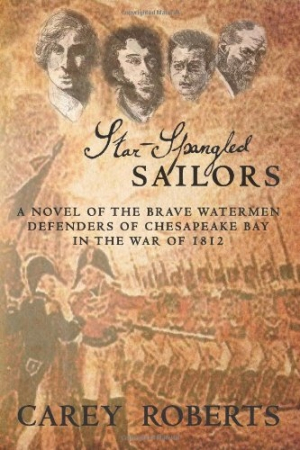
Star-Spangled Sailors
A stirring account of the brave watermen defenders of Chesapeake Bay in the War of 1812
Set during the War of 1812, this is a skillfully crafted story about men grappling with battle-wrought changes to their souls and the bonds that drive them onward.
Though they may not realize it, men fight and die not for a cause but for each other, and Star-Spangled Sailors is about the bonds that drive men onward even after a crushing defeat. It is a compelling theme, and the author explores it through such diverse characters as Mingo Jones, a resentful, free black man, two orphan teens, and the brash Captain Jack Webster. With its historically accurate backdrop, their stories unfurl like a battle flag in a stiffening breeze.
Star-Spangled Sailors is the tale of the men and boys of the Chesapeake Flotilla during the darkest hours of the War of 1812. Scattered and demoralized when their boats are set aflame, their commodore wounded and captured by the hated British, they and the ragtag American army are on the verge of total collapse. From the unimpeded British march on Washington, D.C., and the burning of the president’s home, to the famous battle of Fort McHenry, men of the Flotilla play key roles in defending their fledgling country. But this book is more about these men grappling with battle-wrought changes to their souls than with the battles themselves.
The characters and their travails in the face of overwhelming odds all ring true. For example, the destruction of the Flotilla nearly ruins the young Captain Webster, for he feels he has failed his commander. He suddenly doubts his courage and abilities. Yet Commodore Barney saw Webster fight valiantly and wishes he could tell the man that “now was the testing time, that a man is only a coward if he quits when he’s behind.” But Webster’s redemption can only come from within.
Author Carey Roberts skillfully wends the novel’s story lines around the intertwining paths of her characters. For instance, as the characters become separated and are followed in various chapters, she returns to them before too many pages are turned, lest the reader forget the particular predicaments involved. Also, Roberts wisely avoids bogging down her brisk narrative by the overuse of nineteenth-century syntax and slang when the characters interact. And she lets the story breathe just enough between action sequences by delving into the psychological make-up and complex motivations of her characters. The reader can appreciate the conflicting feelings of these men as they strive to regroup after the initial defeat. For just as Captain Webster finds redemption in remembering his duty, the fiercely independent Mingo Jones comes to realize he is not truly free, either, for the two desolate boys need him.
The author definitely knows her subject matter. She is a lifelong student of American history and her film script, Chesapeake Morning, is based on the story of the Star-Spangled Sailors. It won the 1996 Worldfest International Film Grand Award for Best Screen Play.
This book will appeal to anyone who enjoys well-crafted historical fiction or to those who would like to learn more about one of the least-understood wars in American history.
Reviewed by
Alan Couture
Disclosure: This article is not an endorsement, but a review. The publisher of this book provided free copies of the book and paid a small fee to have their book reviewed by a professional reviewer. Foreword Reviews and Clarion Reviews make no guarantee that the publisher will receive a positive review. Foreword Magazine, Inc. is disclosing this in accordance with the Federal Trade Commission’s 16 CFR, Part 255.
